In a victory for environmental campaigners fighting to prevent the use of bee-killing pesticides, the agrochemical giant Syngenta on Friday withdrew an emergency application seeking permission to use such chemicals in the UK this planting season.
As the Guardian Damian Carrington reports:
Syngenta's neonicotinoid pesticide was given a two-year ban by the European Union in 2013 due to research linking it to serious harm in bees. Neonicotinoids are the world's most widely used insecticide and in June an international scientific review concluded that contamination was so pervasive it threatened global food production.
Syngenta argued that there was a future pest threat to oil seed crops that justified an emergency exemption and the government's advisory committee on pesticides said the criteria for an exemption had been met, although the evidence of the threat was not made public.
As part of a coalition to uphold a ban on the European use of neonicotinoids, a class of chemicals used in pesticides shown to be extremely harmful to pollinating bees, both Friends of the Earth and Avaaz were among those who reacted to Syngenta's decision with celebration.
"Our under-threat bees can breathe a bit easier," said Andrew Pendleton, a coordinator with Friends of the Earth, in a statement. "We're delighted Syngenta has withdrawn this application. The scientific evidence linking neonicotinoid pesticides to bee decline is stacking up. Ministers are currently finalising their action plan for protecting Britain's bees and it must get tough on all the causes of bee decline, including pesticides."
Emma Hockridge, head of policy at the UK-based Soil Association, called the decision "a victory for pollinators and for science." She continued, "There was no good reason for allowing this derogation and the impact could have been catastrophic."
And Bert Wander, a campaign organizers with Avaaz, said: "It's great news that the huge swarm of protest killed off Syngenta's attempts to try and keep their bee-killing poisons in Britain's fields. We welcome their withdrawal and we hope this is the end of it."
Though Europe has maintained its ban and campaigners continue to press for stronger protections for the world's most effective pollinating species, efforts in the U.S. to ban these pesticides and other toxins have continued to falter despite the growing threat.
_______________________________



